#brain vomit in the tags
Text
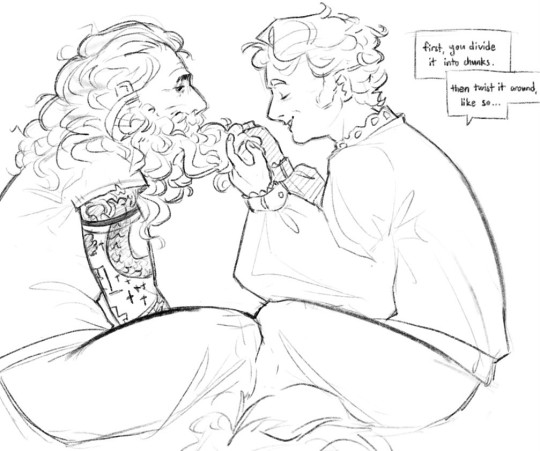
braidbeard hehehhahauaggaghu
(full mini comic has been posted)
#ofmd#ourflagmeansdeath#blackbonnet#gentlebeard#guys whats the official name for them skcjsf#renew as a crew#fanart#ofmd fanart#ive literally just finished the show and ive drawn stede and ed more than ive drawn ineffable husbands#apparently when it comes to az and crow im just as constipated as they are#wait no i meant it as in like#agh you know what i mean#never read my tags please its just brain vomit#stay tuned for izzy hands content hehehshshhehe#stede bonnet#edward teach#ed x stede#blackbeard x stede#adopt our crew#taika waititi#rhys darby
209 notes
·
View notes
Text
ahsoka, sabine wren/shin hati, M, 13k
Ahsoka had brought her to Shatterdome once her body had healed, a long two years of rehab and recovery, and she had pushed herself through simulations and copilot candidates until she had been deemed unsuitable for a return to active duty, too locked into the grief of her lost copilot to let anyone else into the drift with her. Grounded. Useless.
One look at Shin Hati, freshly arrived in Shatterdome to be matched to a new copilot after her uncle and copilot had ascended to a leadership role alongside Ahsoka, with her pale hair and pale skin and pale eyes, angular and striking and unwavering, and Sabine's carefully-constructed equilibrium ruptures into seething, scalding hatred.
@critter-of-habit made me do it
#writing tag#sabine wren#shin hati#wolfren#ahsoka#star wars#i sat down to work on the next chapter of chef au and instead vomited out 13k of this#because my brain is a shitshow apparently#😬😬😬
248 notes
·
View notes
Text
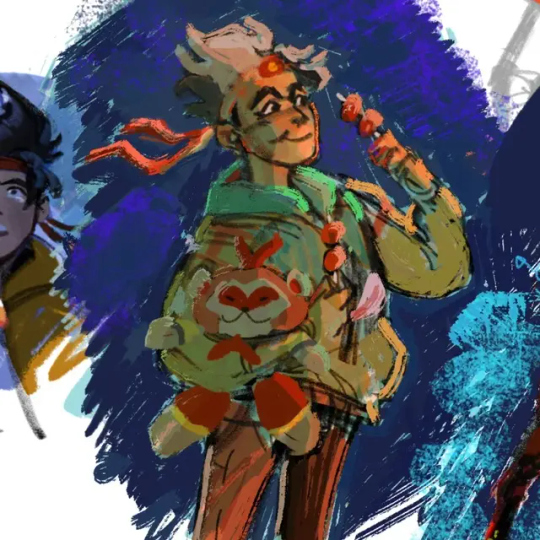
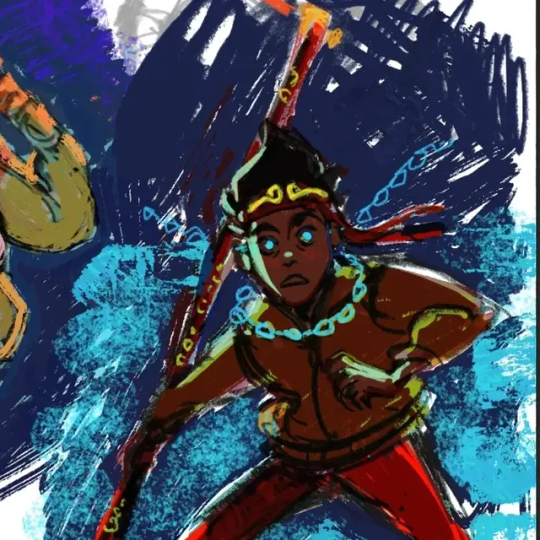
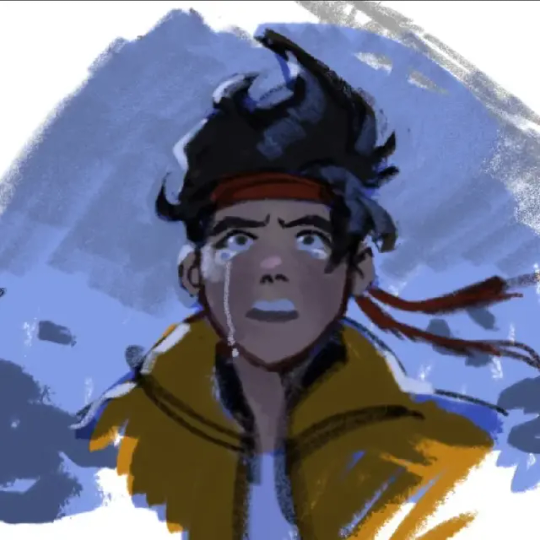
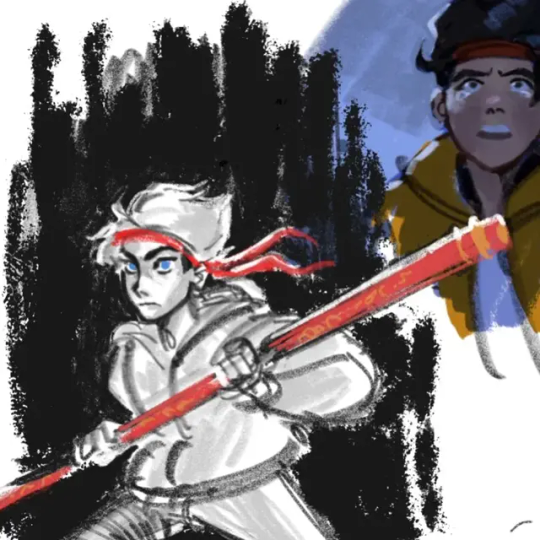
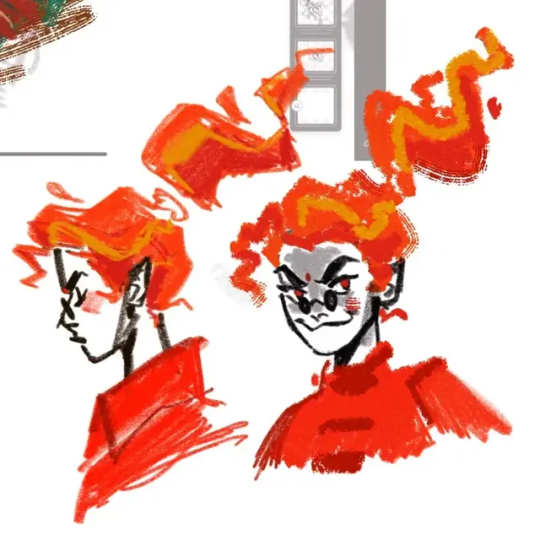
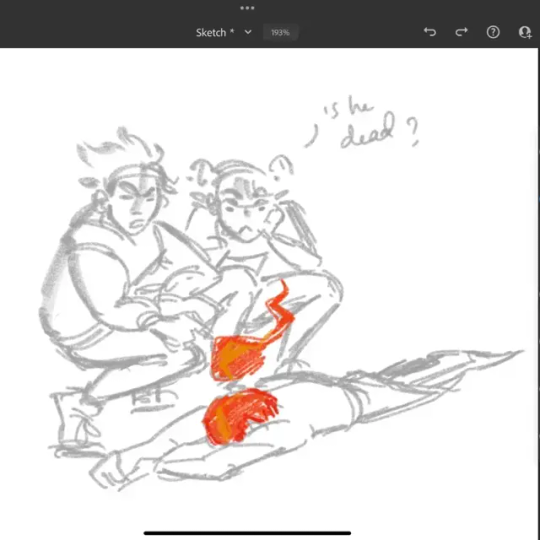
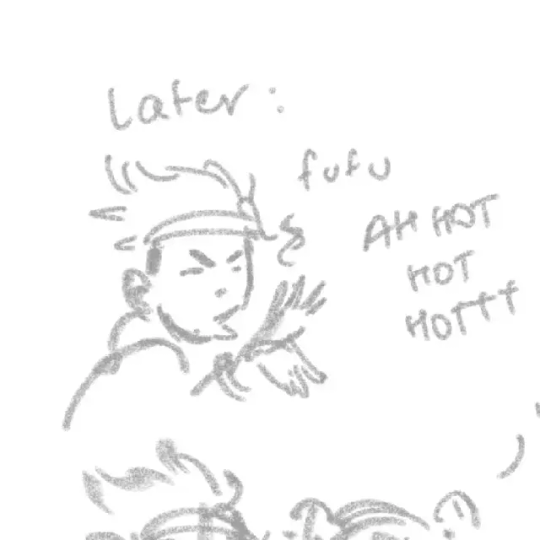
Scribble dump ft. MK and Red Son!!! (More of a blending mode and brushes experiment)
#lmk mk#mk#red son#mei#lmk mei#quick sketch#adobe fresco#lmao i tagged this post but like#the tags suddenly disappeared#so#myart#my art#lego monkie kid#lmk red son#lmk#digital art#experiment#lighting#yes i love them hehehehe#feels good after vomiting sm from my brain lmao it was congested w ideas#i have to make an actual piece someday dude. omg#also wukong PLUSH AAA#lego listen to me pls.#lego#I NEED IT AS MERCH#i swear#nyways#hope y'all likey dis#season 3 lbd trauma hehe my beloved#sorry im drunk my tags r haywire
78 notes
·
View notes
Text
hi this is your reminder that having homicidal thoughts does not make you an inherently bad or broken person. your intrusive thoughts don’t define you as a person. and anyone who says otherwise can go vomit blood and die :3c
#this post is intended for my fellow ‘scary schizos’ who do experience homicidal thoughts and urges#but it also goes for everyone who experiences them. you are not a bad person just because your brain wants you to be. i love you#schizophrenia#actually schizophrenic#actually schizospec#<- using the ‘actually schizo’ tags because people do reddit schizoposting bullshit on this site#schizophrenic spectrum#intrusive thoughts#homicidal ideation#actually schizo#vomit cw
251 notes
·
View notes
Text
WHAT DO YOU MEAN THE HEAD OF THE ISSAC INDIGO STATUE FOLLOWS YOU WHEN YOU MOVE
#friend of mine played indigo park's first chapter and walked up to it#and yeah turns out that thing moves#indigo park#indigo park spoilers#just in case tag#zeisty king's brain vomits
44 notes
·
View notes
Text
Justice as spectacle in Fontaine, or a too long word vomit from a tired PhD in Law gushing over Genshin 4.0
Alternative title: “Justice must be seen to be done”, a visual playbook by Genshin 4.0
Intro: This is a valid use of a PhD in law, actually.
I made the mistake of playing the 4.0 update of Genshin while I was finalizing my PhD in law and politics, and the result was my brain refuse to think about anything else than judicial performativity and the use judicial spectacle in Fontaine. So time to make good use of 9 years of University by dissecting why I absolutely love how Fontaine’s justice system is presented. It was initially much longer and covering why justice as a spectacle is not necessarily an issue or sign of a disfunctionning legal system, then what exactly about the Fontainian justice system is actually fucked up, but it got too long so I’m keeping that for the indeterminate future. So the pitch of this thing is: Mihoyo is basically providing us with an animated First Person POV game version of legal ethnographic works on justice and the courthouse, and it is really cool.
And since I am a nerd with both too much time to read and to play, we are making this a proper academic, with literature and all, because listen to me, LEGAL ACADEMICA IS COOL, ACTUALLY, and law and literature at large is a genuine field of study that we, as a society, need to talk about more.
[also there is non-zero chance that I edit this brainrot and submit it for publication at some point]
Warning: I am basing this on 4.0, up to and including Act IV Chapter II (hence no discussion of the prison system) and if Mihoyo thwarts the whole thing with 4.1 [oops I am late so now 4.2, since 4.1 did not thwart it] then let’s do what we do when new results contradict existing theories in academia and just collectively agree to ignore it.
TL;DR: Someone at Mihoyo read Simonett’s 1966 essay on The Trial as One of the Performing Arts [Here, just read it, it is fascinating] and decided to make it everyone’s problem
Part 0: if this was not Tumblr.com I would make a recap explaining broadly what Genshin and Fontaine are but since you are reading this I’m going to assume you already know the context.
Part 1: Ok so how does the Fontanian Justice system work, exactly?
Alright, so each area of Teyvat has 1) one core theme/value and 2)a threat to that core theme/value.
Mondstadt has Freedom and people living in fear of a dragon.
Liyue has Contracts/order and the pandemonium of having Rex Lapis killed.
Inazuma has Eternity and being virtually frozen in time.
Sumeru has Knowledge and being entirely manipulated by the Akademia.
Fontaine has Justice and… Justice being parodied into a spectacle?
WRONG.
Because the spectacle of justice, especially the way it is done in Fontaine, is not antithetic to Justice itself. Spectacle is part and parcel of Justice and of any courthouse. Sure, all the dials are turned to 11 and y’know, it is legit called an Opera, but that is more the writers being a bit on the nose and adding drama for the player. The spectacle of Justice, itself, is not that far off from reality. And, hot take but bear with me: it is not (necessarily) a problem.
Ok, let’s dive into what we know of the justice system in Fontaine.
Broadly speaking, we have seen the criminal justice system, and it is an accusatorial, or adversarial model. It’s the US-style criminal procedure: you have a defendant trying to prove that they didn’t do it your honor, and a prosecutor proving that they totally did it your honor. To avoid this becoming a fistfight, you have a strict procedure to follow outside but especially inside the Court, and in the end, a neutral third party decides on the outcome or the trial.
Ok, now let’s zoom on a few things, and why the theatrics of them are actually very common.
Furina, our cringefail darling, is the prosecutor. And they get a lot of stuff right regarding the role of the prosecutor! She decides whether or not to prosecute, based on the information that she has, and whether she likes her odds or not. Fittingly since she is the Archon, the prosecutor in a trial represents the State, the interest of the State (the judge ! does ! not!). It makes sense that Furina, the ruler (theoretically) would be prosecutor and not judge. Moreover, and as we see plenty of times during the trials, Prosecutor Furina is not concerned with the victim, and not even necessarily with the truth; the prosecutor wants to know how likely they are to obtain a conviction in the end. Her job is to be convincing enough to establish a legal truth.
Neuvillette, for his part, sometimes look terribly powerless… but friends, that is what a Judge sitting during a criminal case often is. The first part of his job is to find sufficient information for the prosecution to decide whether or not to prosecute; he is supposed to be entirely neutral at this stage. He kickstarted the investigation straight after the death of Cowell, and was also the one starting investigation on Vaughn right after Lyney is proved innocent. He gathers enough evidence, hands them over to Furina and asks “So? Are you game or do you want to leave that alone?”
And once the prosecutor has decided to move forward with prosecuting, his job is to make the procedure move along, take some decisions based on new information, ensure all respect the rules (hence Childe’s immediate smackdown when he starts to act out a bit too much at the end. My man is here to make sure the rules are enforced and that also applies to Snezhnayan gremlins). In the liminal space of the courthouse, he is the supreme authority… over the procedure. He can tell anyone, including Furina, to stfu k thx. He starts and stops the trial. He allows witnesses to be heard or not.
And the last party involved at this point is the defense, usually the Traveler and any adorable twink we befriended that day [good for you, Traveler, good for you]. They present evidence, they have to be convincing, it’s basically Ace Attorney, we know that part.
Part 2: Mihoyo makes it clear that we are all actors in the Courtroom
Ok, first moment of pause.
Even though these are the most basic parts of a criminal trial, they are ALREADY steeped in drama and theatrics, both IRL and in Fontaine.
First off, Furina plays a prosecutor, Neuvillette plays a judge and the Traveller plays the lawyer.
No but really: they play their role in the Courthouse.
The game painstakingly presents Furina for the first time not as a prosecutor in a courthouse but as a cringefail princess. When we see her initially welcoming the Traveller, going “Fight Me” at them in the streets of Fontaine, she is not a prosecutor, she is just Furina the cringefail princess. We meet Furina as Furina, and later on only, we see her with her Prosecutor face. Furina is not a prosecutor, outside of the Courthouse.
I don’t even have to explain how much Traveler plays lawyer. We are, and I cannot stress it enough, NOT lawyers (yes, even you who developed an unhealthy obsession with Ace Attorney before Genshin). The developers even took the time to develop an entire new gameplay to really, really highlight that is a behavior that the Traveler can only have in the Courthouse. Traveler is not a lawyer outside of the courthouse.
Neuvillette is a bit of a special case. We do meet him for the first time in the Courthouse, as a Judge. But once again, the moment we meet him outside of the courthouse, he is much more approachable, definitely not the same persona as when he bitchslapped my problematic Harbinger into the Meropides prison [we are so going to write something about the Meropides prison once I have played enough 4.1 my friends – update post 4.1: ok Mihoyo that was weak commentary on the privatization of prison and prison labour but I’ll take it]. Neuvillette is probably the one that is the most associated with his courthouse persona, but there is still this gap between Neuvillette-Judge and Neuvillette-reflecting-in-the-end-of-Chapter-II.
So everyone is just themselves in their daily life, but there is something about a Courthouse that turns people into their judicial role. That’s what we call the liminality of the courthouse (Hadar, 1999). And it exists IRL, in a way shockingly close to what we see in the Opera Epiclese.
Magistrates, whether prosecutors or judges, do not act in their own names, they have a role to play. Someone woke up that morning, had breakfast, swore at the neighbour who did not park properly again, spilled some coffee on their documents again ffs, stumbled a bit on the little steps leading to the courthouse, and then, they put on their costume and started to play the role of the judge. As someone who has been in what can only be referred to as “backstage” of a court , and entered the courthouse with the magistrates, I cannot stress enough how drastic the shift in person is the moment a magistrate steps into the space of the trial room.
From there on, they are a Role. Furina, like any prosecutor, is not a prosecutor, until they are The Prosecutor, and then they are not themselves anymore, in the enclosed space of the courthouse. Have you ever seen a lawyer talk in their daily life the way to talk in a courthouse? No. Someone is just some person, until their put on the robe and their Lawyer Face and start their Lawyer Movement and Lawyer Tone. Traveler cannot go all OBJECTION when they have a disagreement with a random shopkeeper in Teyvat. The game doesn’t even give you the option – because you are not lawyer, unless you are in the court. None actually plays a lawyer, unless they are in the courthouse.
And an adversarial model encourages this. You have character, but for it to be a play, or an opera, you need a narrative (murder, ok, that will kickstart a narrative) and you need dramatic tension. Drama is created by the opposition of two characters having opposite goals, confronting each other. Simonett, a former Minessotta Supreme Court Judge, has a fascinating article called “The Trial as One of the Performing Art”, which really ecapsulates how an adversarial system is built on this drama:
‘The trial has a protagonist, and antagnonist, a proscenium and an audience, a story to be told and a problem to be resolved, all usually in three acts”.
More than an inquisitory model (hello, fellow continental Europeans), parties are encouraged to bounce off each other, take initiative, undermine and interact with each other. US courthouse TV shows loooove that, and Genshin absolutely leaned into that. The potential for drama was so strong and intrinsic to the story that For the first time, we got to play a character that was not even with the traveler: Traveler was off investigating, and we played Navia in the courthouse, because the sheer drama of being in the courthouse is too good for the game to pass.
Do you see it yet? Here is more. A judicial role is a role. IRL, a lot of it is emphasized by the robes -the - sometimes complete with wigs and accessories- that judges and magistrates must wear before entering the space of the courthouse. You put them on like you put on a costume -defendant, prosecution, judge and even audience alike (Cabatingan, 2018), there is a ritual of preparing for the performance of a trial the way you prepare for a play. Genshin characters cannot change their clothes [give us a proper fancy-af-judge-robe for Neuvilette Mihoyo you COWARDS], so the game does all it can to realllllyy show you a separation between the judicial role and the actor playing I in the courthouse.
Part 3: Game designers said yes this an Opera and a Courthouse because these are the same thing and they are right
[The urge to include Foucault in this section, but I do not have Discipline and Punish with me rn, rip]
Ok, ok, why not. But what about the stuff that is not in your random courthouse, like a damn AUDIENCE and the fact that it takes place in an actual OPERA ?
Aight, we gotta dive a bit deeper into two things: the role of audience in the judicial spectacular, and studies on legal architecture/judicial space. I told you legal research was cool.
Let’s start with the most obvious one: architecture.
The architecture of Courthouse is actually really important for the delivery of justice. The building embodies the task itself, and targets evert single person that interacts with the building in any way? It matters specifically because we take it for granted, that this this is just a building, that there cannot be more to it. Or: “Law in its everydayness, banks on the usage of visual means of representation, for they seem to lack artifice, and thus enjoy high persuasiveness” (Kumar, 2017, also this is a study on the architecture of the Indian Supreme court and it is so good). But thi is, of course, on purpose.
My friends, your local courthouse looks like an opera. Recently, I went to a play which was entirely a trial, and they barely had to do anything to set-up the scene because… the opera looks like a courthouse, and vice versa. Fontaine’s Opera Epiclese is this on steroid, and also actually used for entertainment like the magic shows, but its architecture and structure are so close to a proper courthouse that once you see it you cannot unsee it. Not matter how different they might look from each other, all, ALL courtroom have the same setup:
Judges on an elevated position compared to all other parties : Neuvillette absolutely kills it here [my man is placed so high up I was close to writing something about the religiosity of justice.]
Prosecution and accused on two opposite sides, virtually separated by the judge, even putting the defendant in their own little liminal space in the liminal space (Zoettl, 2016, Mulcahy, 2007)
Audience space and trial space clearly separated, with interdiction for the audience to enter the trial space
Audience space allowing to clearly see all angles of the trial space
The architecture of courthouse is strikingly similar to that of an opera’s, both in its spatial organization and its grandiose. The entire building is an opera, not just the ground of the stage. You even have a lobby, the space right in the Opera but not the courtroom, which is very similar to the space where people mingle during the interlude at the Opera – the social settings were many legal negotiations happen (Hansen, 2008)
[Fun fact: I am pretty sure the design of the audience space of the Opera Epiclese was inspired by two Parisian Opera houses: the Théâtre de la Comédie Française et the Théâtre du Châtelet. The stage itself is almost more church-like ; I am curious if anyone knows what the inspiration for the “outside building” actually was, for the Opera Epiclese?]
Eltringham (2012) has some really cool writings about the architecture, and people interact with the structure of courts (in his case, the International Criminal for Rwanda) and how all these features contribute to making the courthouse this liminal space where people can play their role, whether they realise it or not.
But, Almost-doctor, I hear you say, what about the spectacle ?! The audience enjoying the show ?!
Ah, yes. The audience. Just as with an Opera, the audience and the actors enter through differentiated means (the “segregation of circulatory systems”), all with their own point of access to the stage or the seats, and never the two shall meet. It is so important to a court system that you will find this feature highlighted by the architects that renovated the Bordeaux Courthouse and the US courthouse design and planning guide [These are just fun and striking illustration I stumbled on while writing this, you can find dozens of others from any given country]. These differentiated access path help reinforce the liminality of the courthouse not just for the actors, but for us, the audience as well.
You could even agree, with Garapon, that the audience itself is “playing” the audience, in the Courthouse (go read Garapon’s 2004 book, if you read French, it’s so good I swear and like it fueled 90% of whatever this word vomit is)). You are not really yourself, you have new, liminal role of spectator. A trial has a “need for a public”, even a silent one. “'Performance always intends an audience”, for Kapferere. and we can indeed talk about a Performance of Justice, when talking about how justice unfolds in the courthouse, especially in a criminal trial (Sausdal and Lohne, 2021).
The audience is an inherent part of the spectacle of justice – because is there a spectacle if there I no audience? If comedians perform a play with no audience, did it really happen? In the words of our own European Court of Human Rights (I am quoting the ECtHR on Tumblr.com, what is life): “Justice must not only be done, but must also be seen to be done” (Delcourt v Belgium, 1970). For Garfinkel “Legal rituals ... depend on the outside witness to confer on them not only recognition but validity” (Garfinkel, 1956);
Or, to put it more eloquently: “The need for the presence of a validating public at trials is enshrined in many constitutions and built into the very fabric of court complexes throughout the world. (…) Tthe court as a whole requires its reflection in the bodies of validating witnesses in order that this created place will bring sufficient gravity to itself.” (Eltringham 2012).
If a courthouse was just about the truth, or the parties involved reaching an agreement on what the truth is, there would be no need for the theatrics. We could handle a trial in a meeting group like problem-solving session in any run-of-the-mill company. Put everyone around the table, have a moderator, have a decider. That actually exist, it’s called arbitration, and you may have never heard of it despite the absolutely enormous amount of money that are involved (we are talking literal Billions of dollars every year, here), because the whole point is that it is discrete and confidential. But that is not how trials are, anywhere. It does exist though. It is called private arbitration, a form of private justice that focuses on problem-solving, expediency and secrecy, often because my friends, it involves big names and big money.
But justice? My friend, it needs to be a spectacle. It needs an Opera. Because this is how it gains sociological legitimacy, and it needs sociological legitimacy to function. By having an audience, it gains transparency and accountability.
Conclusion: teaser on why the spectacle of justice is not necessarily always totally bad, but also I am too tired to fully argue that.
Now, you might that it’s a bad idea. That what Genshin is doing is denouncing this inherently spectacular aspect of Justice, that there is something inherently wrong in justice being public and publicized for the gain of legitimacy, and sure, spectacular justice can become a parody of justice or a manipulation of justice and this has happened many times in history. And yes, you could go for that (although show trials have typically been at the service of an authoritarian regime in a transition phase, rising or declining, and target political opponents, which we do not see in Fontaine) but… I have another take for you.
Justice being a spectacle is not… inherently bad.
Hear me out. Making justice into a spectacle does not have to affect its outcome. The presence of a public does not change the course of a play.
Spectacular justice brings elements of entertainment such as narrative fulfillment and catharsis. That is clearly what Fontainians want: a satisfying end to the story, the truth exposed. Justice as a spectacle help people make sense of their reality, comfort them in knowing that justice does prevail. That the guilty do not go scott-free, that the good guys win, that justice is transparent, that prosecutor need to be able to build a good story to prosecute, and there is no good story is there is not someone who caused harm, and a victim that deserves justice. And, from the information we have so far, this does not seem to lead to miscarriages of justices, or a generally biased justice system. But frankly this is too long already and I just wanted to show that the depiction of the Spectacular in everyday justice is actually present everywhere IRL, and Genshin is just providing a really handy illustration, at this point of the story.
The Fontanian system is fucked, don’t get me wrong, but that’s not about the spectacular on its own. Long story short since it be worth its own word-vomit-style essay, it’s because the jury has been replaced by ChatGPT and there is no civil court, only a criminal court, k bye.
#I have no idea what this is it just would not leave my brain until it was written#genshin impact#tagging genshin bc it is the most relevant#law and literature#Usual followers feel free to ignore#Genshin people: this is NOT my usual content#might fuck around and turn it into something publishable at some point#this is probably still full of typo but I am not proof reading a word vomit that goes on this hellsite
132 notes
·
View notes
Text
literally cannot stop having sebagrelle thoughts
im about to be so obnoxious
imagining sebastian slowly falling for her but in his own demonic way. he starts off as being annoyed and slowly gets used to her antics before he realizes he actually does have some sort of feeling outside of resentment.
grelle would be completely oblivious and just enjoys having someone who enables her general bullshit. does she know it's bad? yeah but thats why shes having someone whispering in her ear to do it.
it's more like a devil on her shoulder than an actual good healthy relationship but if it's healthy, it's not victorian
them accidentally meeting at places but mutually decide to just be neutral since they have so much on their plate already.
imagine the conversations they would have... i feel like it would get somewhat philosophical intertwined with whatever's on grelle's mind.
she will be going from how she's stressed about her job to explaining her apathy when handling souls which she knows he would understand. ofc making jokes poking at how she's probably making him hungry- much to sebastian's dismay.
i could see one night grelle accidentally getting too cuddly with him when they're talking on her bed and falling asleep on him.
it's like a dilemma to him because he wants to push her off but she's soooo peaceful and sooo cute when she's not trying to attack him and- oh he's pushing her off the bed then trying to lie and say she rolled off herself.
they're the type of couple that would tease the everloving hell out of each other and ofc go wayyy too far but still adore each other (sebastian somewhat but grelle definitely)
i love when grelle is portrayed as a cracked mirror to sebastian. they mutually understand each other but there's so much that's different and so much they couldn't possibly understand
like why grelle would feel so mixed on killing her previous master or why sebastian didn't kill her and wanted to torture her (basically) instead or why grelle bothers to stay with a dispatch that doesn't trust her and underestimates her talents or why sebastian doesn't just get ciel killed anyway
i feel like they'd ask questions about each other that would just be so prying to other but it's okay because it's mutual. they're intentionally seeing who would crack first and try to theorize as to why.
oh and def post-ciel, sebastian is visiting grelle a lot more often and they're free to do more together. they also don't have to worry about leaving each other's scent or hairs on each other
and ik yana said that grelle would get "bored" if sebastian hit on her and yeah, i agree. but cmon, he's not hitting her in the traditional way. he's doing it as a demonic being that doesn't understand his emotions yet he knows he wants her more but can't put it in a way that she would understand.
#this is just word vomit but they're rotating in my brain#black butler#kuroshitsuji#grell sutcliff#grelle sutcliff#sebastian#sebagrelle#sebagrell#sebastian michaelis#im sooo normal abt them#i really am#shipping headcanons#black butler shipping#grell#uhhh do i need any other tags?#we will find out!
41 notes
·
View notes
Text
i didn’t know that being always too hot or too cold is also dysautonomnia holy shit everything is coming together
#ink’s brain vomit#dysautonomia#everything makes sense#i’m too lazy to tag this but yeah#just omg so much makes sense now#this is the diagnosis i needed
44 notes
·
View notes
Text
starting to realize that whenever i find myself going "i am too sick and burnt-out and tired and shitty and foggy to write anything ever again," the actual solution to my problems is Not to stop writing forever. it is instead just. to sit down and write a horror story. whatever horror happens to spring onto the page. bc there will always be Some kind of horror story ready to pour forth. easy as breathing. it's always there. like yeah girl you ARE tired. it's because there's horror in you. you listen to unbelievably gruesome horror-tragedy fiction podcasts to lull yourself to sleep bc they are Genuinely Comforting, of fucking COURSE your burnout self-care is gonna involve writing horror. "why can't i write all the NICE stories that people actually LIKE" girl you CAN. eventually. but you have GOT to puke the black sludge first i'm fucking BEGGINGGGGGG,
#autoimmune tag#horror#this becomes extremely funny though because i often dont know exactly what shape The Ugly Feelings are gonna take#they just kinda come out and once i've written them they're gone from my brain and i feel better. exactly like vomiting#then after a day or two away i go back and READ the story and i'm like#JESHSSUSUA FUCKING. JESUS. WHAT THE FUCK IS THIS. THIS IS FUCKED UP. THIS IS WHAT I WAS FEELING????#yeah bitch!! you felt fuckin Bad!! VIEW IT!!#toh memory photos real except it's me with my insane psychological horror drafts like 'who wants to diagnose me'
112 notes
·
View notes
Text
I really do love how the world of Genshin Impact, of Teyvat, is set up to guide the Traveler to godhood and make them a "good" god at that.
Because one thing is for sure Celestia is limiting the world - it is paraded as the highest of high ideals to achieve but all it's appointed Archons are named after demons. As a metatextual reader this creates an immediate discrepancy between the "heavens" imploying "demons" to rule humanity. Furthermore, Venti calls Celestia's waters foul, its fruit bland. A front that looks all nice and shiny but is rotten at its core.
And while somehow the Traveler's Sibling was made part of the world and conversely is under the laws of Teyvat's existence, the Traveler themselves is not. They are an outsider unbound by the rules and affected differently than the inhabitants of this world.
And as they set out to find their Sibling (notably, GUIDED by Paimon whose irl mythological counterpart is also a King of Hell), they traverse the world and meet its Archons. Along the way they learn, consciously or not, what makes a "good life" and how the gods all try to enforce their ideals - their dreams. One after another, the gods, the lands, the world itself imparts their dreams of a good life upon the Traveler.
The kind but apathetic Traveler that from the beginning only ever cared for their lost Sibling, not for the world of Teyvat. The blank slate that continues on without a single dream of their own. This Fallen Star, who has traveled hundreds and thousands of worlds before, learns what it means to live and to care for the future of this world.
And so their journey slowly teaches them:
In Mondstadt, they learn of the importance of Freedom as one of humanity's highest ideals - thus always to tyrants. Deep down we're all meant to be free.
In Liyue, they learn that for society to function properly there needs to be a social contract between the people, the gods, nature itself. Because "even the wind cannot blow on forever." Freedom cannot exist without Order.
In Inazuma, they learn that linging to the past will only serve to make the world stagnant. Order is all well and good but trying to conserve the past will only prolong grief and suffering. Change is inevitable - the only thing to ever be eternal - and dreams the catalyst.
In Sumeru, they learn that history is written, it is malleable. But while it may sometimes is better to erase pieces to lead to a brighter future, you can't erase history to escape responsibility and accountability. To know ourselves and others well is the most difficult and meaningful work to do. Knowledge is a blessing and a burden - and we bear the responsibility to hold ourselves and others accountable for the actions and paths we choose.
And the Traveler's journey continues on, even as they suffer, have to learn how to handle their own emotions, and decide for themselves what they want the future to be. And they continue to learn until the day of their ascendancy...
When their wishes, their dreams, become strong enough to reach the False Heavens and the Starry Abyss.
#genshin impact#aether#lumine#the traveler#venti#zhongli#raiden shogun#raiden ei#nahida#genshin theory#well more like#genshin analysis#tags are hard#probably not a new take in any way but i needed to get it out of my brain#otherwise the brainrot will not let me sleep#hee hoo flowery word vomit from your favorite rando on the internet#jo's theory corner
387 notes
·
View notes
Text

okay so anyone following me can just politely scroll past this but the release of this album is genuinely so monumental, i just want to record some of my initial thoughts
every song sounds so incredibly good!!!! like first of all the production is absolutely god-tier, but with a cast of 钱雷, 尹约, 唐恬, 沃特艾文儿, 徐威, and 周天澈, how could it not be. but also, all of them have worked so closely with zhou shen over the years, so all the songs of this album just feel… so zhou shen. like it’s so him. it’s so perfect. in every single song you get to peer more into his worldview and that in itself is so 🥹
Track 3: “Restart” 重启 made me cry on the second listen. i felt emotional the first listen, but ig i didn’t pay as much attention to the lyrics (bc i have the chinese literacy of a grade schooler lol), but when he sang 太多次迷路 太多次失误 (“lost my way too many times, made mistakes too many times”) i started tearing up. especially with the lyrics related to trying to do his parents right, it just hit really close to home for me. and the line 重来几次才能清楚 (“it’s only clear after a few redos”)—personally it was a really healing song overall
Track 4: “The Memory Store” 记忆商店 is, if you forced me to choose, probably my fave from the album so far. it’s just straight up haunting. it’s so dystopian and so poetic. it makes me feel like, i can’t describe it properly, but do you know in the studio version of “Doomsday Spaceship” 末日飞船, in the bridge portion where zhou shen hums Clair De Lune, and its so haunting and full of wistfulness for a bygone time? that’s the closest description i can give you of how it feels.
when he sings 不虚拟的拥吻 想不想买 没噩梦的睡眠 耳边goodnight (“a non-fictitious kiss—do you want to buy? a sleep without nightmares, a goodnight in your ear”) is SO CHILLING AND SO SATISFYING AND SOUNDS SO GOOD its gonna be stuck in my head for the next few years. 他说想再荡个秋千 妈妈我想飞的高点 星球以光束穿越 妈妈我想落到地面 (“he says he wants to swing on the swings again—mom i want to go higher. the planet is travelling at the speed of light—mom i want to get off now”) okay brb i’m just gonna go into the woods and scream. 岛屿还未消失这个世界还曾下著雪 亲爱的我很抱歉 不朽的 没有了 没人记得 (“before the island disappeared, this world even used to snow. my dear, i’m so sorry—there’s nothing not decayed, no one remembers it”) SHENSHEN GET OUT OF HERE RIGHT NOW BEFORE I GO CRAZY
Track 5: “Alarm” 警报 is uhhh. alarming. apparently the english name is The Giver which also fits really well. it’s such a direct and kind of chilling way for shenshen to remind us to take care of ourselves, but also this song is gonna haunt me in a whole different way. every single line goes so hard and has so many implications. i might try to translate it later but for now, if you know you know 😵💫
Track 6: “Mind Your Manners” 少管我 OUR BELOVED. SO CATCHY SO ADDICTIVE. apparently in his interview with cosmopolitan magazine (which i still haven’t read yet), shenshen says this song (WHICH BTW HE IS PARTIALLY CREDITED FOR IN THE COMPOSITION AND LYRICS) is written for shengmi. ”希望歌迷们对自己说的:当我决定好做自己的时候,谁也别管,也管不了” (loose translation: “its my hope that everyone will say to themselves: what i decide for myself, no one else should dictate it, nor can they dictate it.”)
#again these are just my own initial thoughts!! i can never resist the urge to brain vomit#my mutuals are probably thankful i didnt inflict them w this in their dms djfjjfJDJFHFN#zhou shen#ramble tag#also i love how QQ music puts the number of ur album that u bought#apparently he sold half a million digital copies in about an hour or smth crazy like that#edit: nope it was half an hour even crazier sjhfjfj#honestly it was smart of him to only release half the album first bc my brain probably wouldve exploded if we got it all at once LMAO
17 notes
·
View notes
Text
not to start on my shit again before it's even 8 in the morning, but. *but.* A small thing I've noticed, that relates back to that post about icarus' crying I made last night, is just how. quiet? dialed back? icarus' panic is - at least, when people are around. Icarus' panic is never loud - sometimes you have to look look to tell they're even panicking. it's never nearly as noticeable as a lot of people's. And there's something to that. something about the way they hide their panic and their tears until they're alone. I don't necessarily think yesterday as a whole is a good example of that - they definitely do it with the crying, but not necessarily the panic. The stream with Fable and Icarus from Friday though, you can see this whole idea a little easier. They panic from the second they wake up from the memories, and they definitely calm themself down a little, but the second fable comes down to check on them, they dial it back. Their panic gets quieter and dialed back the whole time fable is there - and sure, that might be a good thing, but. *but.* (Not the first time this has happened, but definitely the most recent example that comes to mind.)
#i dont know if early morning sage is making sense but this makes sense in my brain#its makes sense to me and thats all that matters#this is the silly word vomit yall didnt get last night cause i was more coherent#/silly /maybe this makes sense i dunno-#sherbertquake56#icarus morningstar#fable smp#fsmp#a tag to help find my own posts
25 notes
·
View notes
Text
All fae know who Puck is. Bright, bold, and beautiful, he shines by Oberon's side. Sometimes here, sometimes there, sometimes in the shape of a horse, a hound, a chair, a flame. Sometimes even in the shape of another fae. His wit is cutting, and he has a tendency to walk a thin line, slipping just shy of any blame.
No one knows who Puck is. Not really. They see the flame of a fairy carrying out his king's will with glee. They never see the leash Oberon wrapped around Puck's throat long ago. The hold the king has over him is ironclad and unwavering. It allows Puck freedom and protection, but in return binds him utterly to Oberon's will.
Puck loves his king. He does, truly.
But sometimes, he'll lie awake at night, unable to banish thoughts that would surely be considered treason.
He's so sick of being obedient.
#cinnamon writes#puck#puck my beloved#i don't even know what this is my headache has been semi-steadily getting worse since noonish#and i wanted to write a thing and i still have puck on the brain#idk#i love puck and i hate headaches. i wish i could trade the latter for the former bleahhhh somethig something unfajrness of the world#anyways. puck-friend: this is partly for you enjoy#you are part of the reason my brain has been yelling at me about write puck whump sO#also uh#now i am thinking about my description of puck as a 'flame of a fairy' and. uh. sauron#who is ALSO A FIRE MAGCI GOD BEING#idrk mairon is pretty and puck is pretty and#fire#um#word vomit tags
59 notes
·
View notes
Text
I'm taking a survey--I'd love to talk about thoughts for Shutterbug Series and the magic Tim series on here, but I also don't want to spoil the story or future events for people.
Do you feel okay with me just talking about whatever I want even if it's spoilers or even if I don't end up writing it?
Or would it really make it hard for you if I was on here posting potential spoilers at random?
Would you be okay with it IF I had a separate tag for just-thoughts-and-ramblings like "shutterbug braindump" that you could blacklist?
#polls#shutterbug series#coraline au#i didn't have this concern back when i was writing latchkey because it was just so fast and not a lot of people had found and read it yet#and certainly not many followed me on here#but now I know a good number of people do and I don't want to just subject people to my brain dump writing vomits without consent haha#my audience has evolved from what it previously was#i want to make sure i evolve my habits/boundaries with that if necessary too#2024#gold thoughts#i'm going to try to create a new tag to see if i'm still capable of creating new tagging habits i won't forget forever#it's an experiment
21 notes
·
View notes
Text
If there is anything that makes me wanna say "I called it" on, it's the characterization of the Daycare Attendant (Sun specifically) in Help Wanted 2. My version of Sun's personality is almost exactly like the Sun in HW2, and I made him after playing Security Breach (the only difference being he cusses and that Moon is more chill).
I deadass looked at this cheerful weirdo we barely got to see in that game and went "he is both the only adult serving cunt and the most friendly guy to ONLY children out there". And now that's CANON. He is the exact opposite of that one meme image that has "fuck them kids" on it. Sun says "fuck them adults" lmao.
#the disappointment speaks#a day in the life of the disappointment#screaming into the void#love my brain doing this to me#if I had a nickel for every time I called something by accident before it occured (game related)#I'd have 2 nickels. one for Banjo in smash and one for Sun's personality.#if we include irl itd be 3 bc I once told a resident that she's win big at bingo and won 7 out of 11 rounds that day#btw I'll never live that bingo moment down. We manifest bingo winnings to rival the gods here.#but yeah I didnt think I could compare me calling Sun's personality and Banjo in Smash Ultimate ever but here we are!#its like sans and the queen dying. unrelated yet somehow forever linked by correlation.#oh wait I gotta do normal tags too#fnaf#fnaf help wanted 2#help wanted 2#okay enjoy my word vomit people going through the hw2 tags on tumblr. ily
25 notes
·
View notes
Text
ahh, here's another thing with a doodle in it i was hesitant to post if only bc i don't want to risk the stress of getting targeted by The Harassment Engine but, idk, it is just kinda lying around... keep it between us i guess
the As Written By Viv meme was like the universe's little end of the year present to me specifically amidst all the horrors
if you can identify the exact sentence i gave up the pretense of emulation and devolved purely into contempt-soaked parody, you get a sticker
*cw for fatphobia and schrodinger's incest only as far as needed to emulate Unfunny Hack Writing that i did not fucking enjoy typing
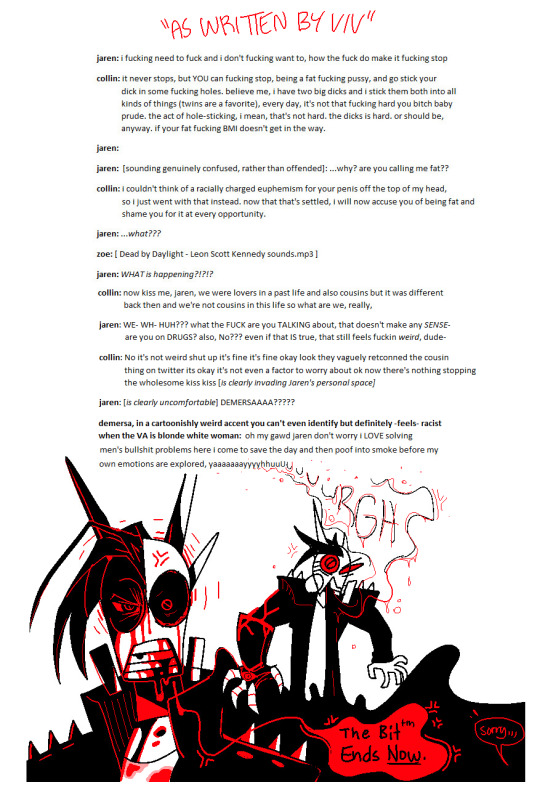
#doodles#thank you caine for being my bitch#its almost like the problem isnt that the humor is crass but is crass Badly and Boringly and has no brain in its head at all#and its meanspirited in an utterly juvenile shallow vapid and often ignorant way that is in fact telling of the person writing it#and even if this IS your style of humor#every 'joke' is one of the same 10 cusswords sprinkled onto an otherwise unseasoned chicken breast of a sentence#put some adobo on that shit i swear to fuckign god ALSO:#stop being an jerk to the underpaid chefs breaking their wrists cooking your bad recipe its not their fault you suck at your end of the job#vomit cw#blood cw#demersa#do NOT get me started on the absolute MESS she considers good drama writing either dear sweet merciful void take me away#hhhhverse tag of spite
29 notes
·
View notes